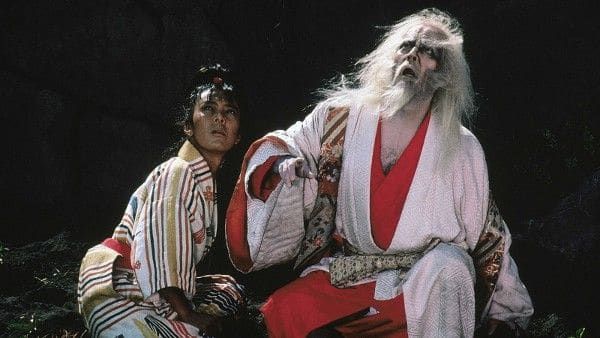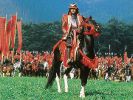Eye For Film >> Movies >> Ran (1985) Film Review
Ran
Reviewed by: Jennie Kermode

There are some film stories you should take with a pinch on salt, and some where things get all too real.
Akira Kurosawa was 74 when he made Ran, seven years after he wrote the first version of the script. It was five years since he'd last made a film, over ten since he'd last had a hit. He could no longer find finance in Japan, but was saved by a French producer who believed in his dream. It was a dream that would unite European and Japanese legends, enriching both; that would see him order over a thousand costumes to be made by hand; that would lead him to build a castle only to burn it down, and to paint a whole field gold only to leave that scene on the cutting room floor. His wife died during filming and he barely stopped, obsessive to the point where he began to blur into his central character, a man he had always seen as his reflection. The result was one of the greatest works of art in cinematic history.

There once was a man, so the old story goes, who had three daughters and asked each of them how much she loved him. "Like gold," said the first. "Like silver," said the second. "Like salt," said the third, and so the man cast his youngest daughter out, and it wasn't until years later, at her wedding feast, where he did not recognise her, that he tasted a banquet prepared without salt and realised what he had done. Shakespeare turned the story into King Lear. Kurosawa encountered it in that version, but was struck by the way Shakespeare had made the old man good. What would such an experience do to another kind of man? And he remembered a Japanese story about the daimyo Mori Motonari and his three sons. Mori, who had slaughtered hundreds to gain power, asked each son to break an arrow. easy enough to do. He then asked them to break three together and they found the task impossible. The problem with this, Kurosawa says, is that it's obviously not true. Right at the start of Ran, one of his warlord's sons proves it. Cinema demands recognition of the real.
Despite this scene, in which more than the arrows are broken, Ran is a film steeped in myth. The warlord's sons, given the keys to the kingdom, fight among themselves. The warlord has no authority over them; in abdicating, he has sought to enjoy some time before his death, but he has effectively killed himself; he has become irrelevant and he drifts like a ghost, in pale Noh-style make-up, through a landscape that becomes increasingly surreal as solid structures crumble. Meanwhile, a hidden enemy conspires against him - a character who wears the same make-up, who is similarly doomed, having inherited her destiny. The warlord is warned about foxes who take human form, spirits whose ambition is to create chaos ('ran') in human affairs. But no such intervention really seems necessary as petty human motives and bad luck prove sufficient to tear apart a one peaceful kingdom.
The question looming behind all this is, of course, what did keeping that kingdom peaceful cost? The warlord isn't simply a victim and he isn't reaping the whirlwind of his misdeeds only in material terms; he's also pursued by unseen furies, driven mad by his guilt. It's no accident that he is the focus of most of the film's close-ups whilst others are seen at a distance, sometimes intentionally out of focus, their humanity barely recognised or relevant as armies surge against one another. Toru Takemitsu's score, styled after Mahler, reflects another doomed man, inviting parallels with the disintegration at the heart of Death In Venice. Only Kurosawa himself seems to escape this corporeal damnation. From his own obsession, he has produced this cinematic jewel.
Cinema on this scale is a rarity, but Ran has much more to it than grand vision. It has, despite the madness, an unusual clarity of perspective. In its fusion of ideas, it finds something unique.
Reviewed on: 31 Mar 2016
















